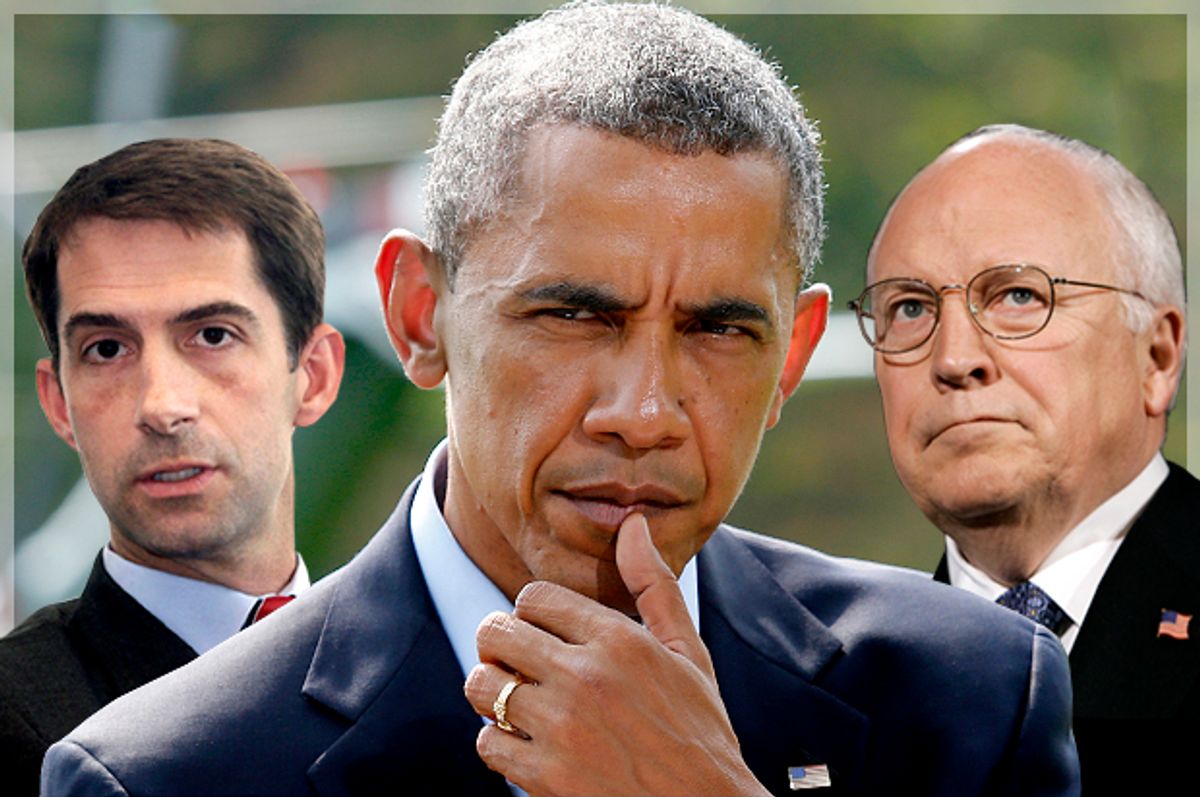There was never really much doubt that Republicans in Congress would come up short in their effort to scuttle the multilateral diplomatic framework over Iran’s nuclear program. They would have needed a large number of Senate Democrats to side with the likes of Dick Cheney in defying the White House, rebuking President Obama’s foreign policy platform, and splitting with the party’s 2016 presidential candidates. Such an outcome wasn’t terribly likely, and today Sen. Barbara Mikulski (D-MD) put an end to whatever slim hopes opponents of the Iran deal may have had by becoming the 34th senator to support the agreement, ensuring (assuming no one switches their vote) that whatever roadblock Congress throws up will not survive a presidential veto.
So with the Iran deal’s fate largely secure and the Obama administration set to win a major foreign policy victory, let’s take a moment to thank the people who made this political triumph possible: Iraq war supporters.
The most potent argument the president deployed in making his case for the deal was that the alternative to diplomatic engagement with Iran is war. That argument had punch for two reasons: the reality of a war launched to disarm a hostile regime in the Middle East is still very fresh in the minds of voters and politicians; and so many of the opponents of the Iran deal are themselves Iraq war supporters who, to this day, refuse to admit the invasion was a costly and catastrophic error. While stumping in support of the nuclear agreement, Obama argued that those who pushed hard to oust Saddam Hussein lack the credibility to criticize his diplomatic rapprochement with Iran. “The same politicians and pundits that are so quick to reject the possibility of a diplomatic solution to Iran’s nuclear program are the same folks who were so quick to go to war in Iraq and said it would only take a few months,” he said in a July speech.
The deal’s opponents tried turning this logic on its head by arguing that Obama’s engagement with Iran would actually lead to more war (just about every conservative columnist and attention-seeking Republican official invoked the 1938 Munich Pact and the wages of “appeasement”) but they were consistently undermined by their own side’s nakedly bellicose and insanely inflammatory rhetoric about the deal.
The GOP’s 2016 candidates, after spending weeks trying to figure out whether they would have invaded Iraq in 2003, came out in unified opposition to the Iran deal, with some promising to unilaterally withdraw from the agreement on their first day as president and slap Iran with more sanctions and threats of military action. Mike Huckabee invoked the Holocaust and ripped off Lyndon Johnson’s “Daisy” ad to hype the threat of nuclear war. Dick Cheney, the snarling face of discredited neoconservative policy, is out there calling the deal a disaster that will need to a global nuclear conflict. Leading Republican hawks John Bolton and Sen. Tom Cotton expounded on the virtues of bombing Iranian nuclear facilities.
There were some worries early in the congressional review process that Democrats would fall back into their old habit of being cowed by aggressive Republican posturing and break with the White House out of fear of being labeled “weak” on national security. With some notable and isolated exceptions, that hasn’t happened. Put simply, Obama’s political argument in favor of the deal was helped along by the character of his opponents: it’s a lot easier to whip up support for diplomatic engagement when the other side is represented by the same people who plunged the Middle East into chaos just over a decade ago.


Shares